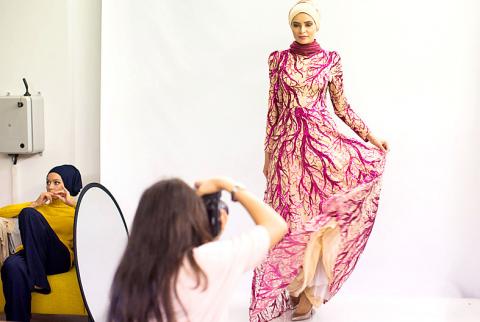The model adjusts her clothing, stares at the camera with a hint of a smile, holds her head high and the photographer starts snapping.
However, at this photoshoot on the Asian side of Istanbul, the models, impeccably made up, sport no body-hugging Western styles.
All wear headscarves and loose fitting outfits in a shoot for one of the industry’s fast growing sectors — modest, but trendy Islamic fashion.

Photo: AFP
Istanbul is positioning itself to be a hub in this nascent industry, which according to the Dubai-based Islamic Fashion and Design Council could be worth almost US$500 billion within decades.
Modanisa, a Turkish online Muslim clothing retailer, started small in 2011 and today is one of the biggest names in the market. It offers more than 30,000 products — from casual tunics to shiny evening wear to sports gear, shoes and accessories — from 300 brands and ships to 75 countries.
The firm calls itself the “first online fashion and shopping Web site for women who embrace a modest dressing style.” Modanisa chief executive Kerim Ture said that in years past there was so little choice that a religiously conservative young woman had no option but to wear the same clothes as her mother.

Photo: AFP
“If that was happening in a country [Turkey] where 99 percent of its population is Muslim, we wondered how the situation was around the world,” he added. “That’s how we’ve started our worldwide Web business.”
BURQINI BAN
Ture was surprised by this summer’s furor in strictly secular France over whether Muslim women had the right to wear the Burqini swimsuit, which covers all but the hands, feet and face.
French courts ultimately ruled that a Burqini ban by about 30 towns was “clearly illegal” and a violation of fundamental rights.
For Ture, the Burqini is not a symbol, but a choice.
“I barely understand how a country, one of whose main pillars is freedom, can oppose the Muslim swimsuit,” he said.
His firm’s catalogue offers a range of “fully closed swimsuits” starting at 40 euros (US$45), and, ironically, its Burqini sales jumped during the debate by 15 to 20 percent to France and 30 percent to the Netherlands.
In May, Istanbul hosted its first conservative fashion week at the historic Haydarpasa train station to showcase this rapidly growing market. It was organized by Franka Soeria from Indonesia, another center for Islamic clothing.
As a global consultant on modest fashion trends, Soeria decided three-and-a-half years ago to move to Istanbul — whose position straddling Europe and Asia, some say, gives it an edge.
The point of offering stylish modest clothing was not to tell people to cover up, but to show that “we are also the same as you ... we don’t want to be excluded, we don’t want to look different,” she said.
“We are showing that, hey, I am modest, I like to cover. I also like fashion. This is just my style. Just accept,” she said.
Osman Ozdemir, a Turkish designer of modest fashion, is the inhouse designer for Modanisa, but is now also working for several other firms.
“I believe Istanbul will be trend-setting on Islamic fashion,” he said. “Even high-profile and luxury brands are getting into the act.”
At the start of the year, legendary Italian fashion house Dolce & Gabbana launched its first line of hijab and abaya — some extravagantly patterned — for Muslim customers in the Middle East.
Though Turkey is a constitutionally secular state, the Islamic-rooted ruling Justice and Development Party, cofounded by Turkish President Recep Tayyip Erdogan, has advocated removing restrictions on the Muslim headscarf since it came to power in 2002.
In 2013, Turkey lifted a long-standing ban on wearing the hijab in state institutions. Last month, the government for the first time allowed policewomen to wear the headscarf under their official caps or berets.
In the conservative Fatih quarter of Istanbul, Islamic fashion stores line the streets, which are awash with billboards advertising modest styles.
“I covered my head three years ago. I didn’t want to dress up like my mother because in the past the clothes headscarf-wearing women could wear were limited,” 16-year-old shopper Seyma said. “Now I can easily find whatever I look for.”
Tourists from the Middle East are also coming to shop in Istanbul.
“I find many things: casual dresses, trousers, T-shirts and many pieces,” said Dalia, a young woman from Saudi Arabia. “I come without anything and buy from here.”
BACKLASH
Not all Turkish Muslims like the trend and see fashion as a Western tool aimed at turning Muslim women into consumer-oriented spenders.
“Islam seeks to form a modest Muslim identity, encouraging need-oriented consumption,” said Hulya Sekerci, an activist with the Free Thought and Education Rights Association, Ozgur-Der.
“On the contrary, fashion is a vicious circle encouraging excessive consumption. That’s why we are against fashion and fashion shows,” she said.
Hakan Yildiz, professor of political science at Istanbul’s Bosphorus University, said Islamic fashion stores were clearly proliferating in Turkey.
However, “we need at least a generation to see how it will evolve,” he said, adding that it would need “at least 20 years more to see if a Versace of Islam will emerge.”

Meta Platforms Inc offered US$100 million bonuses to OpenAI employees in an unsuccessful bid to poach the ChatGPT maker’s talent and strengthen its own generative artificial intelligence (AI) teams, OpenAI CEO Sam Altman has said. Facebook’s parent company — a competitor of OpenAI — also offered “giant” annual salaries exceeding US$100 million to OpenAI staffers, Altman said in an interview on the Uncapped with Jack Altman podcast released on Tuesday. “It is crazy,” Sam Altman told his brother Jack in the interview. “I’m really happy that at least so far none of our best people have decided to take them

BYPASSING CHINA TARIFFS: In the first five months of this year, Foxconn sent US$4.4bn of iPhones to the US from India, compared with US$3.7bn in the whole of last year Nearly all the iPhones exported by Foxconn Technology Group (富士康科技集團) from India went to the US between March and last month, customs data showed, far above last year’s average of 50 percent and a clear sign of Apple Inc’s efforts to bypass high US tariffs imposed on China. The numbers, being reported by Reuters for the first time, show that Apple has realigned its India exports to almost exclusively serve the US market, when previously the devices were more widely distributed to nations including the Netherlands and the Czech Republic. During March to last month, Foxconn, known as Hon Hai Precision Industry

PLANS: MSI is also planning to upgrade its service center in the Netherlands Micro-Star International Co (MSI, 微星) yesterday said it plans to set up a server assembly line at its Poland service center this year at the earliest. The computer and peripherals manufacturer expects that the new server assembly line would shorten transportation times in shipments to European countries, a company spokesperson told the Taipei Times by telephone. MSI manufactures motherboards, graphics cards, notebook computers, servers, optical storage devices and communication devices. The company operates plants in Taiwan and China, and runs a global network of service centers. The company is also considering upgrading its service center in the Netherlands into a

Taiwan’s property market is entering a freeze, with mortgage activity across the nation’s six largest cities plummeting in the first quarter, H&B Realty Co (住商不動產) said yesterday, citing mounting pressure on housing demand amid tighter lending rules and regulatory curbs. Mortgage applications in Taipei, New Taipei City, Taoyuan, Taichung, Tainan and Kaohsiung totaled 28,078 from January to March, a sharp 36.3 percent decline from 44,082 in the same period last year, the nation’s largest real-estate brokerage by franchise said, citing data from the Joint Credit Information Center (JCIC, 聯徵中心). “The simultaneous decline across all six cities reflects just how drastically the market